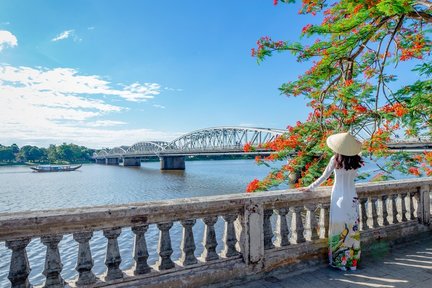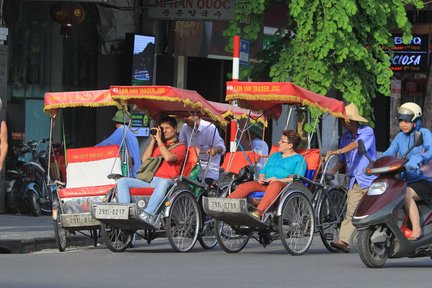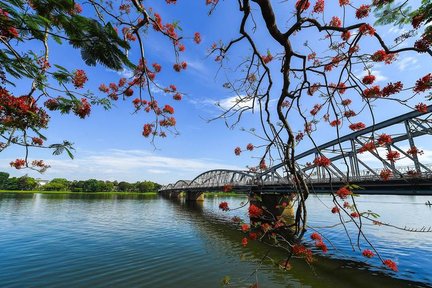Perfurm River

The best of Perfurm River
Bucket-list experiences
Make it a getaway
More to explore
Why people love Perfurm River
Nearby places to go
FAQs about Perfurm River
When is the best time to visit the Perfume River in Hue?
What are the transportation options for exploring the Perfume River in Hue?
What safety tips should I consider when visiting the Perfume River in Hue?
What are the best times of day to visit the Perfume River?
What should I bring when visiting the Perfume River in Hue?
Is the Perfume River tour accessible for people with disabilities?
What to know before visiting Perfurm River
Remarkable Landmarks and Must-Visit Sights
Thien Mu Pagoda
Nestled gracefully along the Perfume River, Thien Mu Pagoda stands as a beacon of spiritual and cultural significance in Hue. This ancient pagoda, dating back to the 17th century, is renowned for its majestic seven-tiered Phuoc Duyen tower, the tallest stupa in Vietnam. Visitors are drawn to its serene atmosphere, where the harmonious blend of striking architecture and lush Vietnamese landscapes creates a captivating experience. Whether you're a history enthusiast or a seeker of tranquility, Thien Mu Pagoda offers a glimpse into the rich tapestry of Mahayana Buddhism and Vietnamese heritage.
Cruise on the Perfume River
Embark on a mesmerizing journey with a cruise on the Perfume River, a quintessential experience for anyone visiting Hue. As you glide along the gentle waters, you'll be treated to panoramic views of the city's enchanting landscapes and historical landmarks, including the majestic Imperial City and the serene royal tombs. This leisurely boat ride offers a perfect blend of relaxation and exploration, allowing you to soak in the scenic beauty and cultural richness of Hue. Whether it's a romantic escape or a family adventure, a cruise on the Perfume River promises unforgettable memories.
Dragon Boat Trip
Step aboard a vibrant dragon boat and set sail on the Perfume River for an unforgettable exploration of Hue's natural beauty. These traditional boats, adorned with bright colors, offer a unique vantage point to admire the city's stunning scenery. Whether you're witnessing the breathtaking sunrise or the tranquil sunset, the dragon boat trip provides a serene escape into the heart of Hue's picturesque landscapes. As you drift along, indulge in local Hue cuisine and let the soothing melodies of Hue Royal Court music enhance your journey. It's a cultural and sensory delight that captures the essence of Hue.
Cultural and Historical Significance
The Perfume River is a living testament to Hue's rich heritage, having witnessed the city's imperial past. As a vital waterway for the Nguyen Dynasty, its banks are adorned with historical landmarks like the Imperial City and royal tombs. The river's natural fragrance, derived from the herbs it flows through, adds a unique charm to its cultural significance.
Local Cuisine
Hue's culinary scene is a feast for the senses, especially along the Perfume River. Indulge in local delicacies such as Bun Bo Hue, Banh Khoai, and Com Hen while enjoying the scenic river views. For a unique experience, try the afternoon tea on a cruise, featuring Royal Herbal Tea, traditional cakes, and fresh fruits, all beautifully presented.
Nearby Attractions
The Perfume River is surrounded by a plethora of attractions that are a must-visit. Explore the majestic Hue Imperial City, the serene An Hien Garden House, and the iconic Thien Mu Pagoda. Don't miss the Hon Chen Temple, Minh Mang Tomb, and the vibrant Thanh Tien Paper Flower Village and Sinh Folk Painting Village.
Historical Significance
The Perfume River was instrumental in the establishment of the Imperial City of Hue, a UNESCO World Heritage Site. Its banks are home to historic landmarks such as the Thien Mu Pagoda and the tombs of Nguyen Imperial Emperors, making it a focal point of Hue's rich history.
Cultural Practices
The Perfume River is central to various cultural and religious activities, including the renowned Hue Festival. Traditional dragon boats glide along its waters, and locals frequently use the river for swimming and other daily activities, reflecting its importance in their lives.



